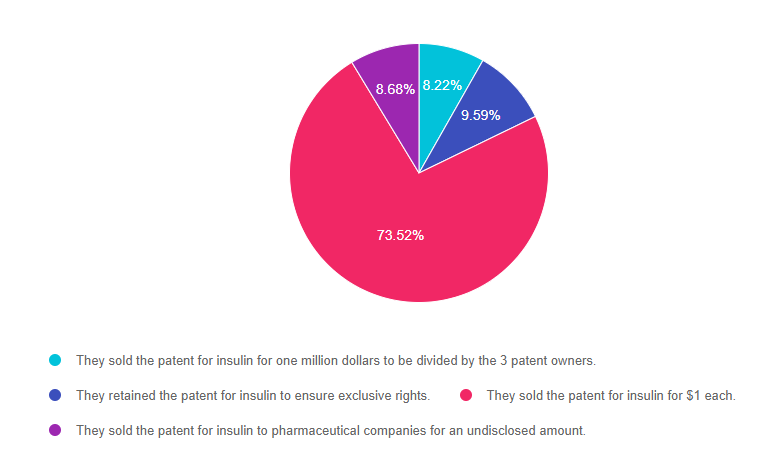
This month, we are quizzing test takers on the history of diabetes. Our November 16th Question of the week quizzed test takers on the cost of the insulin patent. 74% of respondents, chose the best answer. We are excited to share this info with you in celebration of National Diabetes Month.
Before we start though, if you don’t want any spoilers and haven’t tried the question yet, you can answer below: Answer Question
Question:
On January 23rd, 1923, Dr.’s Banting, Best, and Collip were awarded the patent for insulin.
How much did Banting, Best, and Collip each charge the University of Toronto for their share of the insulin patent?
Answer Choices:
- They sold the patent for insulin for one million dollars to be divided by the 3 patent owners.
- They retained the patent for insulin to ensure exclusive rights.
- They sold the patent for insulin for $1 each.
- They sold the patent for insulin to pharmaceutical companies for an undisclosed amount.

As shown above, the most common choice was option 3, the second most common answer was option 2, then option 4, and finally option 1.
Price of the Insulin Patent

On January 23rd, 1923 Banting, Best, and Collip were awarded the American patents for insulin. They sold the patent to the University of Toronto for $1 each. Banting notably said: “Insulin does not belong to me, it belongs to the world.” His desire was for everyone who needed access to it to have it.
In order for the insulin to be mass-produced and widely available, the pharmaceutical company Eli Lilly and Co. were given the right to do so. Currently, Eli Lilly, Sanofi, and Novo Nordisk are the major insulin producers. Insulin is no longer extracted from beef and pork pancreases. Now companies use E. coli and yeast to produce insulin through recombinant DNA therapy.
With insulin patents expiring, we are now seeing the approval of biosimilar insulins that come with lower price tags. This lower-cost insulin keeps Dr. Banting’s dream alive, which is to make insulin a gift that belongs to the world.
Answer 1 is incorrect. 8.22% chose this answer, “They sold the patent for insulin for one million dollars to be divided by the 3 patent owners.”
Answer 2 is incorrect. 9.59% of you chose this answer, “They retained the patent for insulin to ensure exclusive rights.”
Answer 3 is correct. 73.52% of respondents chose this answer, “They sold the patent for insulin for $1 each.” YES, GREAT JOB. This is the BEST ANSWER!
Finally, Answer 4 is incorrect. 8.68% chose this answer, “They sold the patent for insulin to pharmaceutical companies for an undisclosed amount.”
We hope you appreciate this week’s rationale! Thank you so much for taking the time to answer our Question of the Week and participate in this fun learning activity!
Want more practice questions? Enroll in our
Test Taking Practice Exam Toolkit Webinar
20 Sample Practice Questions
Join us live June 30, 2022, for live webinar 2022 updates
You are invited to join Coach Beverly for this FREE Webinar. And, if you want to have access to an additional 220+ sample practice online questions, you can purchase the complete Test Taking Toolkit.
For many of us, taking the certification exam is a nerve-wracking process.
During this webinar, Coach Beverly will help you transform your nervousness into focused energy that will help you succeed. She will provide test-taking tips based on her experience taking the certification exam six times.
2 Ways to Join Test Taking Webinar
Watch Webinar for FREE
This includes a review of 20 sample test questions with test-taking strategies. This does not include access to the recorded webinar or the practice questions.
Purchase for $49
This includes access to the recorded version of this webinar on your Online University Student Portal.
Plus, the Test Taking Toolkit provides you with over 220 sample online practice questions, simulating the exam experience. A perfect way to assess your knowledge and create a focused study plan, while increasing your test-taking confidence.
Don’t worry if you can’t make it live.
Your registration guarantees access to the recorded version.
Sign up for Diabetes Blog Bytes – we post one daily Blog Byte from Monday to Friday. And of course, Tuesday is our Question of the Week. It’s Informative and FREE! Sign up below!
[yikes-mailchimp form=”1″]Accreditation: Diabetes Education Services is an approved provider by the California Board of Registered Nursing, Provider 12640, and Commission on Dietetic Registration (CDR), Provider DI002. Since these programs are approved by the CDR it satisfies the CE requirements for the CDCES regardless of your profession.*
The use of DES products does not guarantee the successful passage of the CDCES exam. CBDCE does not endorse any preparatory or review materials for the CDCES exam, except for those published by CBDCE.









